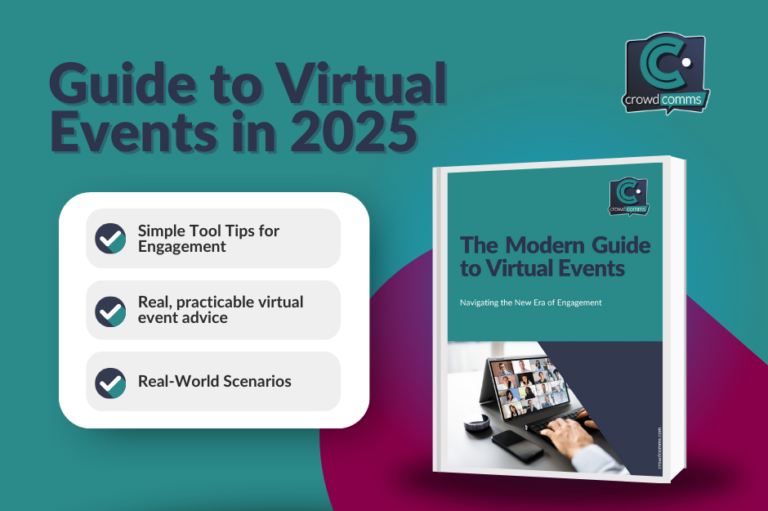Virtual events have transformed the event industry. Cost effective, inclusive, and immersive, virtual events have proven so successful that 94% of organisers are planning to hold virtual events in 2022, and 48% are planning to increase the number of virtual events in 2023.
While a huge success, virtual has evolved at a rapid rate and many planners are still learning how to optimise the technology and overcome some of the perceived virtual event hurdles.
We’ve looked at the top 5 virtual event challenges that keep event planners awake at night, and have put together solutions to help make organising your next virtual event a lot easier:
1. Getting (and Staying) Engaged
It’s understandable event organisers consider audience engagement as their biggest challenge when it comes to virtual events. Unlike in-person events, remote attendees participate in isolation, they’re not contained within a venue and whether they’re viewing from home or their office they’ll have a multitude of distractions (hello laundry!) waiting to distract them from your speaker session.
Keeping virtual attendees engaged doesn’t require a complete re-think on your event agenda, but it does require some subtle tweaks and changes to reflect the fact attendees are engaging remotely.
For example, an hour-long keynote is reasonable for an in-person event. However, that might be too demanding for online viewers. Shorter speech and session lengths will hold attendees’ attention and mitigate screen fatigue.
Creating plenty of opportunities for interaction is also vital to keep attendees glued to their event screen. Live polling, Q&A, surveys and interactive networking are features you can work into your agenda to gauge opinion and feedback, and encourage attendees to participate rather than simply watch.

2. Technology Failure
Everyone loves virtual event technology…until the audio fails, or the connection drops out, or screens go blank. 38% of planners have experienced a technical hitch during a virtual event. It’s no surprise that technology failure is one of the leading causes of sleepless nights for virtual event organisers!
There are two ways to ensure your virtual event technology doesn’t let you down. Firstly, work with a virtual event platform provider with a great support service. Live streaming is like live television. To ensure live broadcasts maintain audio and visual quality and presenters know what to do, television producers have a technical team on hand to make sure everything runs smoothly.
Your virtual event provider should deliver a similar service. Ideally, the virtual event team will consist of:
Producers: who brief speakers, queue them into their session and moderate interactive features such as Q&A sessions.
Technical Live Streaming Specialists: who monitor the live streaming and troubleshoot any issues with audio and visual connections
This team should work alongside you on event day to ensure the live stream and integrated features run without a hitch.
In addition to great service, make sure your virtual event platform is tried, tested and fit for purpose. Experienced providers will deliver software that has undertaken many successful virtual events. They will know the technical pitfalls and will have developed solutions to avoid them, and in the unlikely event things don’t quite go according to plan, they’ll know exactly what to do.
If you’re looking for a virtual event platform provider, don’t be afraid to ask them about their delivery history. Also, ask if you can chat with a few of their current clients about their virtual event experience; a strong track record in virtual event production is a solid indicator your provider will have the service and technical capability necessary for a stress-free event.
3. You’ve Built it… but Will They Come?
Attending an in-person event is a commitment. If an attendee buys a ticket, organises time away from work and sorts their travel, it’s highly likely they’ll show up on the day.
But what if all they have to do is switch on their screen at home?
Although event planners may worry that their virtual event will have a higher rate of no-shows, the reality is the no-show percentage is only slightly higher than in-person events.
However, to maintain a healthy virtual event attendance rate, it’s important to replicate the sense of occasion associated with an in-person event. Charging for event tickets ensures attendees will want to log-in and get a return on their outlay. Sending out goody bags ahead of time will generate some feel-good vibes and connect attendees to the event, and it won’t hurt to have a well-known industry face or even celebrity on board to promote the event via social media and email.
Of course, the most important drawcard is your content. Complement your great speaker roster with interactive networking opportunities and the chance to accrue continuing professional development (CPD) points.
Video-on-demand will boost value by allowing attendees to revisit content as many times as they like (even better if the content has CPD points attached). Innovative virtual event platforms function in a similar way to streaming platforms, e.g., Netflix, by allowing attendees to choose the sessions or videos they’re interested in. It’s an effective way to deliver real value to your attendees and ensure they’re online and ready to engage when your event starts.
4. Avoiding Flimsy Security
A sophisticated virtual event platform will collate huge amounts of data. This data is incredibly valuable to planners who can use it for marketing, event success assessment and obtaining attendee feedback and even real-time planning and communication. However, with information collation comes a critical legal and ethical obligation to keep that data safe.
While a lot of focus is on the front-end virtual event experience, things can go horribly wrong if the back-end platform security isn’t watertight.
Choosing the right platform provider is vital when it comes to security. Ask your potential supplier whether they have a dedicated security team and dedicated policies and processes (such as internal audits and 3rd party penetration testing). Specifically find out if:
The platform (for both CMS and end user) has multi-factor authentication
Provider and platform comply with national and international standards, such as ISO 27001
Provider and platform comply with local legal obligations, such as GDPR
A robust platform security system not only gives you peace of mind as an event planner, it also ensures attendees can interact with all the event features knowing their personal information is safe and secure.
5. Integration Issues
Integrating several disparate platforms into your virtual event solution may feel like a bespoke option; you pay for exactly what you need and no extras. After all, if you’re not running a Q&A session, why pay for a platform that has Q&A as standard?
However, relying on external 3rd party systems to connect with each other can be a real worry. Who takes responsibility if something goes wrong? Is there enough time to test the different systems before event launch? Do you have enough resources to manually input data into the various platforms?
Separate systems can work, but it may take a lot of work and planning to get the right mix for your virtual event.
A seamless, integrated solution is an obvious alternative to multiple systems and software. You work with a single platform and provider and don’t have to worry about temperamental plug-ins, patches or failed app connections.
But, what about the price? Seamless solutions can be surprisingly cost-effective. Economies of scale mean single delivery platforms are often more affordable than you might think. An integrated solution will undoubtedly deliver more reliability with a seamless connection between features, and more often than not, all within budget.
In Summary
The exciting world of virtual events is creating amazing new opportunities for event planners and organisers.
Although there may be apprehension around certain challenges, working with the right platform provider will deliver much-needed assurance and a great virtual event experience for organisers and attendees.




